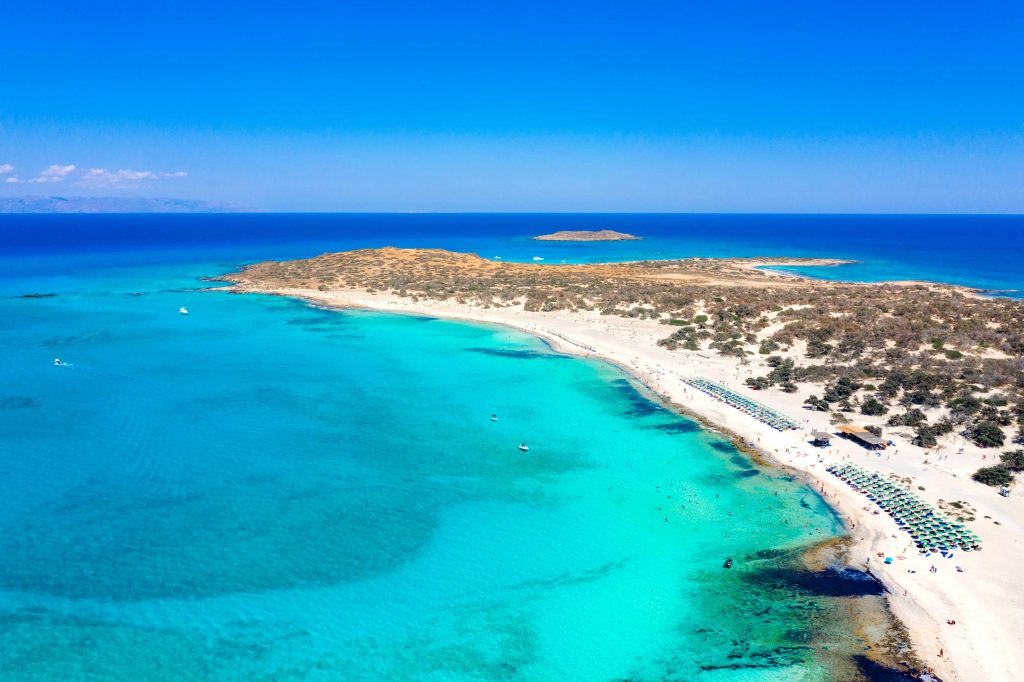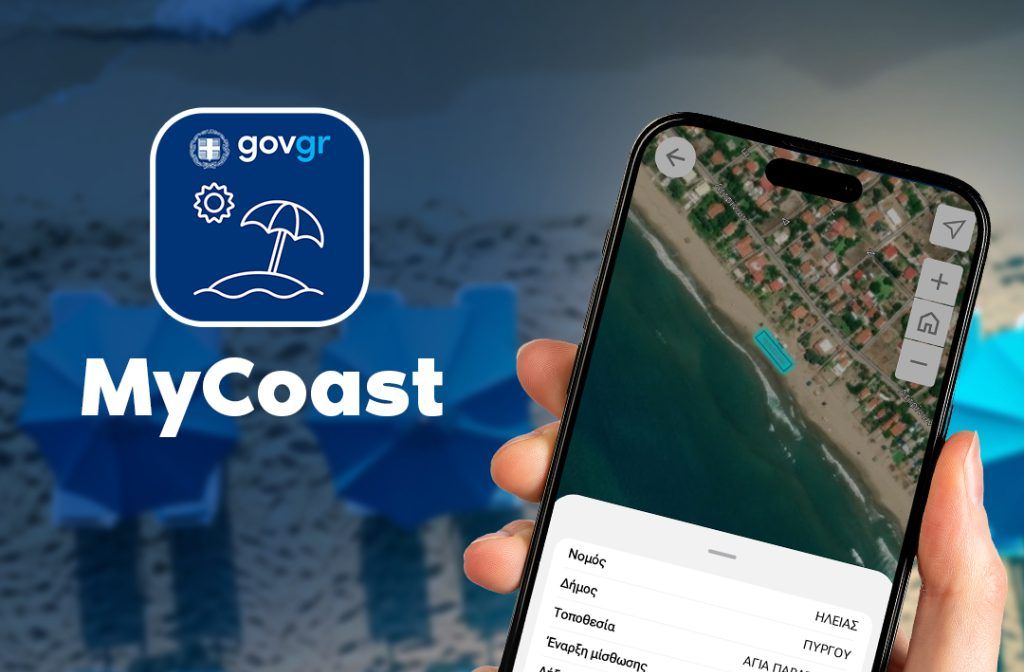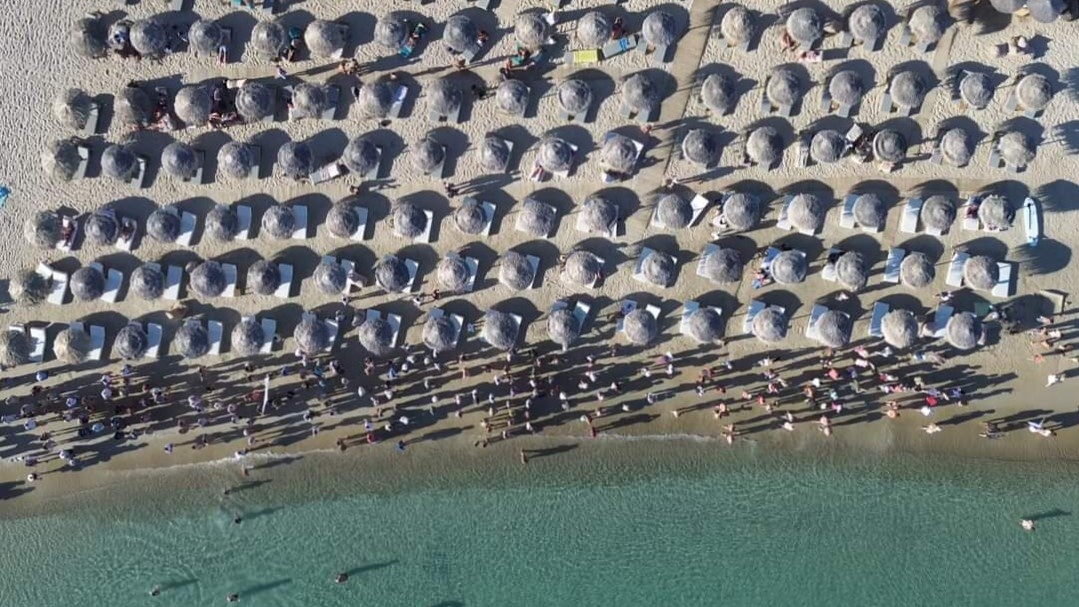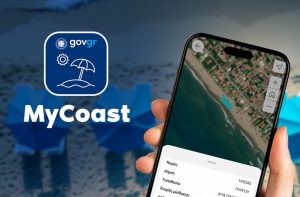In response to mounting frustration over the illegal use of public beaches by commercial interests, the Greek government has decided to engage the public in its efforts to safeguard shorelines and ensure free access for all.
The latest move in this direction is the launch of the free “MyCoast” app which gives users the chance to report beach use and access violations on the spot. Authorities said the app will soon include AI technology making real-time inspections possible.
The action comes after growing public outrage for failure by authorities to put a stop to illegal constructions on beaches across the country.
Sunbeds Instead of Beach Space
The Greek government was pressured into changing an outdated shoreline use law after the so-called ‘Towel Movement’ brought the problem into the international spotlight.
The first protests started last summer on the island of Paros with the “Paros Citizens’ Movement for Free Beaches” after vacationers found it close to impossible to find a free spot to place their towel on the beach. Campaigns against the uncontrolled spread of umbrellas, recliners, and beach bars which seemed to flout existing shoreline laws gained momentum growing into a nationwide movement which also reached neighboring Turkey, with residents and holidaymakers demanding the return of beaches to the people.
Despite regulations stipulating that all beaches in Greece are public and should be freely accessible, reports of illegal occupation of beachfront space have surged in the last couple of years, particularly in the summer at popular tourist destinations.
In addition to unauthorized beach or seaside structures, other violations include breaches of noise and light limits. The situation became even worse when some beach bars were found to have set up constructions in the sea with waiters serving in the water.
Giving Greeks Back their Beaches

In a bid to quell public discontent, Greece’s Economy and Finance Minister Kostis Hatzidakis ordered beach inspections aimed at identifying establishments encroaching on public space or operating illegally.
At the same time, the government pushed ahead with a bold shoreline use law which was passed in parliament earlier this year spurring reactions among environmental groups.
Among others, the amended law mandates that only a limited section of public beach space can be occupied and identifies more than 100 beaches countrywide that cannot be auctioned off for concessions.
More specifically, the law stipulates that at least 50 percent of the beach must be free of umbrellas and sun loungers and that concession areas cannot be greater than 500m2. Beach bars must be at least 6 meters apart, umbrellas and sunbeds at least 4 meters from the coastline.
Measures also target a wide range of infractions, including the construction of unauthorized structures, the placement of vehicles, planters, or fences to prevent beach or sea access; private beach parties; the disposal of garbage, construction materials, or waste.
Moreover, for the first time, establishments or individuals obstructing access to public beaches will be faced with fines of up to 60,000 euros. To ensure compliance, Greece’s finance minister also said heightened inspection methods and new technologies such as drones would be used.
The Greek government’s commitment to clamping down on the dozens of illegal beach operations extends beyond legislative reforms. Plans also include transferring jurisdiction over shoreline use from municipal authorities to the Hellenic Public Properties Company (HPPC), aiming to streamline oversight and accountability.
Meanwhile, consumer rights groups have issued guides to educate citizens on their rights and ways for recourse against beach violations.
Beaches for Concessions

The new law has also increased the requirements for concessionaires who are awarded beach use for their businesses. In addition to increased inspections and stringent fines, they also face harsher penalties for repeat violations such as the sealing off businesses. Beach use concessions will now be carried out via e-auctions.
However despite the government’s decisiveness, representatives from Greenpeace Greece and MEDASSET (Mediterranean Association to Save the Sea Turtles) told to TO VIMA this week that they were wary of the new announcements, claiming that a number of loopholes in the law would allow auction-free concessions for the use of small bays by hotels.
It should be reminded that in 2019 environmental groups in Greece including WWF warned that the amended law, which among others added rooms-to-let to the long list of businesses allowed to use beaches for recreation and leisure activities, was “opening the door to the mass legalization of violations both on the beach and in the sea” and would have “catastrophic effects”.
According to Antonis Bougias, Oceans Campaigner for Greenpeace Greece, “the new law not only complicates, but creates new unacceptable aggravating conditions on the coastlines”.
Also speaking to TO VIMA, Nadia Andreanidou, responsible for programs and policy at MEDASSET, adds that the law “does not introduce a reform for effective protection and management”.
Greece Protects 198 Beaches, Steep Fines
In April, the government banned all construction or commercial activity including beach bars with sunbeds and umbrellas on 198 beaches across Greece as part of its “Apatites Paralies” (“Untouched Beaches”) program. Under the scheme, these beaches cannot be auctioned off for concessions.
The goal of the program, designed in cooperation with the Natural Environment & Climate Change Agency (OFYPEKA), is to protect the environment while supporting sustainable tourism activity. “After all, the environment is a valuable component of the Greek tourist product. Our aim is to be effective,” said Hatzidakis.
The list of the 198 fully protected beaches which are part of the “Apatites Paralies” program is available here.
It should be noted however that the selected beaches are already protected under the Natura 2000 program and the EU’s Nature Directives, which cover a network of Europe’s most valuable and threatened habitats.
Real Time Complaints with MyCoast App

One of the most ambitious actions taken by the Greek government includes the launch of the MyCoast app – a proactive step towards engaging citizens and visitors in efforts to protect Greek coastlines and beaches.
With the app, available here, people can report incidents and violations in real time after accessing the concession status of the specific beach. In cases users observe restricted access or unauthorized installations like extra recliners or umbrellas on the shoreline, they are encouraged to report the incident.
“The MyCoast application will serve as a tool enabling citizens to become the government’s allies in the effort to ensure the orderly operation of businesses on coasts and beaches,” said Hatzidakis.






